“The Only Thing That Holds Them Accountable Is a Camera”
After cofounding Youth Against Settlements, Palestinian activist Issa Amro started giving tours of Hebron, allowing participants to see the violence of Israeli occupation firsthand.
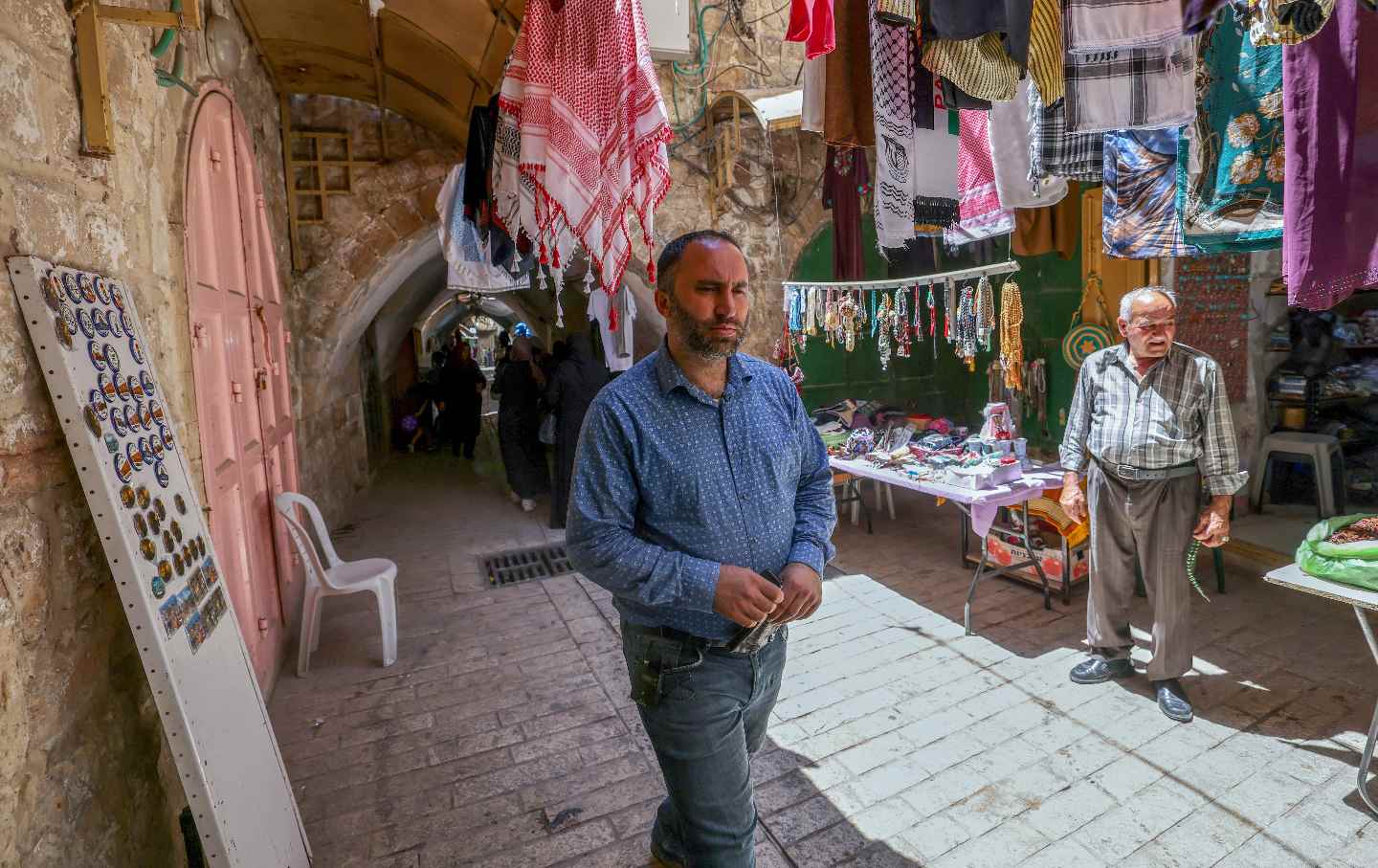
Palestinian human rights activist Issa Amro walks through the market of Hebron’s old city in the occupied West Bank.
(Emmanuel Dunand / Getty)When Palestinian activist Issa Amro was assaulted by an IDF officer in February, he wasn’t surprised. It was just another interaction in his decades-long conflict with the Israeli Defense Forces.
Amro, who was born in a section of Hebron now closed to Palestinians, has been speaking out against the occupation for as long as he can remember. After cofounding Youth Against Settlements (YAS) in 2005, Amro started giving tours of Hebron, Palestine to journalists, activists, and anyone else who would listen. YAS began as a way for Amro and other activists to contest the Israeli government’s ongoing closure of Al-Shuhada Street but morphed into a more expansive human rights organization. While it was active, YAS promoted nonviolent resistance to counter the Israeli occupation. It organized the international Annual Open Shuhada Street Demonstrations and weekly protests in Palestine, and was represented as a nongovernmental organization at the United Nations Human Rights Council.
Since founding the group, Amro has been frequently targeted by the Israeli government and arrested hundreds of times. During the attack in February, Amro was approached by a soldier who asked him to stop filming, when he refused, he was choked, pushed to the ground, and repeatedly kicked by the soldier. While the Israeli government condemned the assault and sentenced the soldier to 10 days in jail, the international community believes the response has been inadequate.
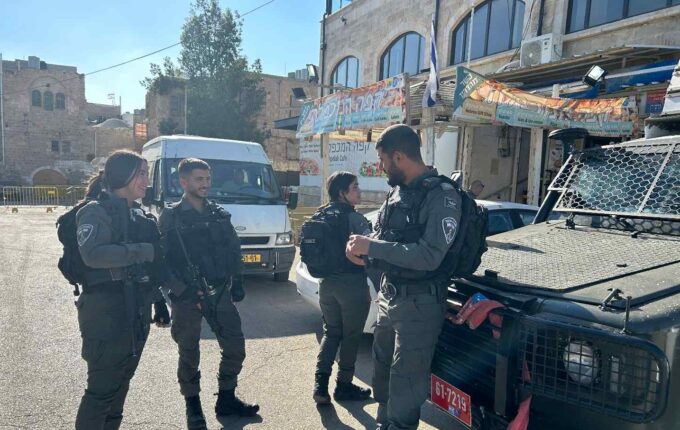
For his work with YAS—and his involvement in many other aspects of the struggle for Palestinian liberation—he was named “human rights defender of the year in Palestine” by the UN in 2010. Since then, Amro has doubled down on his mission, focusing his work on Hebron’s Old City.
Visiting Hebron, which is located at the southern tip of the West Bank, I passed through a TSA-style security screening and was questioned by the IDF. A soldier eventually allowed me to pass, although Amro pointed out that I was lucky that the officer didn’t know I was with him. “He wouldn’t have let you through.”
After Amro walked me through the history of Hebron on the steps of a home just past the checkpoint, we started walking—and wouldn’t stop for the next three hours of the tour.
Palestinians living in Hebron typically refer to al-Shuhada Street as “Apartheid Street.” In 1994, half of the area was closed after riots following the Ibrahimi Mosque massacre. Al-Shuhada was previously a commercial and cultural hub for Palestinians living in Hebron. After the closure, B’tselem estimates that 36 to 43 percent of Palestinian shops in the city permanently shut down.
It was later labeled “H2,” or under Israeli military control, which subjected Palestinians to Israeli military law, while Israeli settlers in the same area were subject to Israeli civil law. Hebron is divided in half, with “H1” under the control of the Palestinian Authority.
As Amro was quick to point out, there are 22 Israeli checkpoints, around 100 movement barriers, and 1,000 empty Palestinian apartments in Hebron. During Amro’s three-hour tour through Hebron, participants see the violence of the occupation firsthand.
That is Amro’s goal: “to make the occupation costly. Raising up Palestinian voices by showing the reality of the occupation.” The Israeli occupation is not just about the land, but who controls the narrative, and Amro is doing everything he can to counter the falsehoods from Itamar Ben-Gvir, the far-right Minister of National Security of Israel.
But doing so has put Amro’s life in danger. I witnessed this firsthand while we walked through the streets of Hebron. The tension between him and the Israeli soldiers was palpable. When I asked if the Israelis knew who he was, Amro replied, “They all do.” According to Amro, he and Youth Against Settlements are a part of the IDF’s security briefing for soldiers recently stationed in Hebron.
Popular
“swipe left below to view more authors”Swipe →After the tour, I asked his fellow activists what they thought of Amro. More than one said, “He’s crazy”—with a definite note of admiration. Amro is fearless. As soon as he walked to the edge of the H1 section of Al-Shuhada Street, the point at which he could not cross, Amro struck up a conversation with an IDF soldier, asking him what he thought of the occupation.
After Amro confronted the unidentified IDF soldier, he said it would be only a matter of time before the soldier radioed back to base, located just 500 meters down the street. A squadron of IDF soldiers pulled up beside Amro in an armored vehicle. A man who appeared to be the commander of the troop turned to Amro and asked who I was. “She’s my friend. She’s American. She’s a journalist. And we are very close friends. And we are talking about my life.” Amro said he feels safer in the presence of a journalist. “The only thing that holds them accountable is a camera.”
But as much as Amro was worried about his own safety, he was also concerned about mine. He reassured me again before the tour began. “You feel comfortable, you are with me. I know everybody. This is your home. Okay? And you are safe, 100 percent. If I feel there is a risk, I will take you out. The risk will be on me.”
As Amro walked through the Old City, he stopped at nearly every stall to say, “As-Salaam-Alaikum” and to share a few words with the vendor. Amro isn’t just interested in confronting the Israeli occupation but also in building resilience in his own community. For him, this means supporting Palestinian-owned businesses, promoting tourism in the area, and making residents feel safe.
As Amro explained, the brutal part of the occupation is not the direct violence, but the day-to-day limitations on Palestinian freedom that eventually pushes longtime residents out of their homes. Amro was quick to highlight the way that the Israeli occupation of the Palestinian Territories dehumanizes those tasked with carrying out their lives under the constant threat of violence.
After walking through Ibrahimi Mosque, the site of the 1994 attack by Israeli extremist Baruch Goldstein that left 29 Palestinians dead and 125 wounded, Amro stopped to chat with two friends working at a pottery workshop located directly across from Ibrahimi Mosque. Even during the tour, Amro’s work in the community didn’t stop. He pulled out his phone and began to record. “I’m filming a promotional video for them. It’s important to get the word out.”
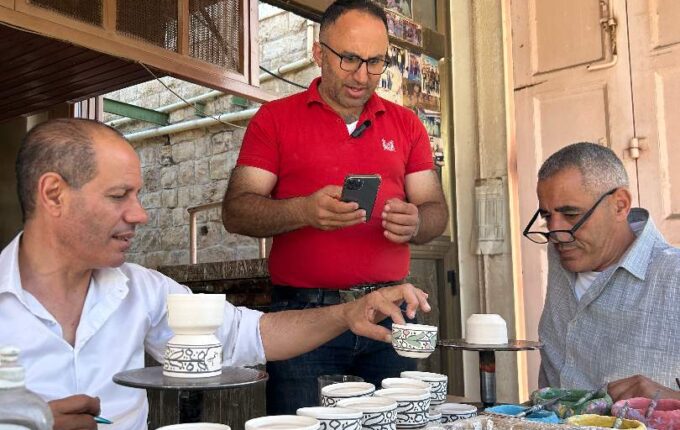
Amro isn’t allowed to walk through the H1 section of Al-Shuhada, so instead, just like his Palestinian neighbors, he walks through the centuries-old cemetery, through an olive grove, and finally, through a section of barbed wire to get back to his house. But yet again, Amro stopped to talk to his neighbors to ask about an incident that occurred the week before. “I knew them when they were children,” said Amro with pride. “I open the door to their homes as if I were an owner.”
As Amro looked down at Al-Shuhada Street through a barbed wire barrier, a group of Israeli settlers approached us and asked us to leave. Amro refused, asserting his right to stay on the land he is legally allowed to live on. Even if the IDF won’t confront him for fear of international backlash, Israeli settlers will. “They can do whatever they want to us. This is exactly what happened last time,” said Amro, referring to the altercation in February. “The settlers find a soldier to ask us to leave—exactly the same beginning.”
The Israeli settlers then walked to the al-Shuhada checkpoint, and an off-duty soldier waved Amro and me down from the fence. Worried the Israeli settlers would start to throw rocks, I started to back away, but Amro remained firm. “Don’t stop. Don’t be afraid.”
As the off-duty soldier approached Amro and me, the Israeli settlers began applauding. Amro replied sarcastically to the IDF soldier’s comments, unfazed by the threat of violence, while the settlers continued to gather on the street below. As I worried that Amro would once again be attacked, we finally walked back to the house.
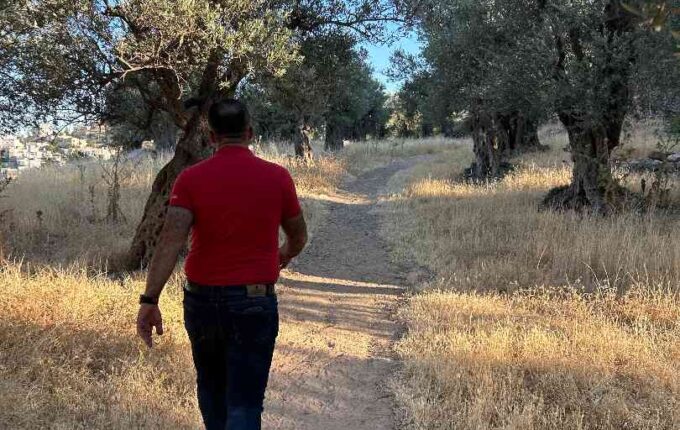
Amro’s city, Hebron, is here to stay, but he fears that the attention will fade. As a steward of the city and one of Palestine’s most high-profile activists, it appears Amro is willing to do just about anything to fight back. He’s willing to sacrifice anything, including his life, to protect Hebron from the violence of the Israeli occupation. For the time being, giving tours to visiting journalists and organizers is part of his job description.
While walking through the centuries-old cemetery, I learned that Amro decided to leave not for his own safety but for mine. “They arrest me, two weeks, then they release me. I’ll stay here. But you, they’ll deport you. So I don’t want that. I want you to see the city and come back again.”
More from The Nation
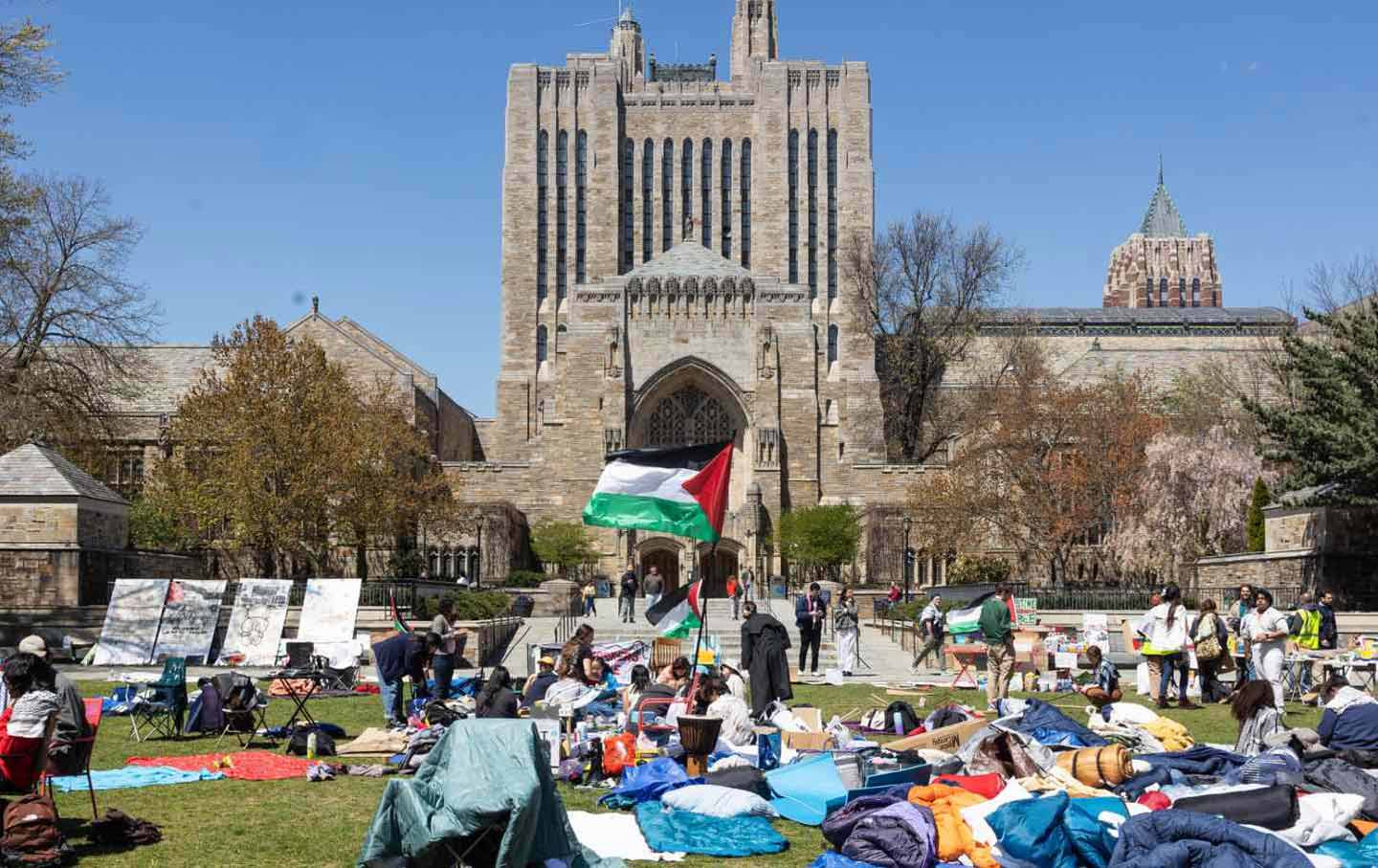
Yale Students Voted to Divest, but What’s Next is Unclear Yale Students Voted to Divest, but What’s Next is Unclear
The referendum calls on the school to divest its $41 billion endowment from military weapons manufacturing firms, yet the power to do so is in the hands of the board of trustees.
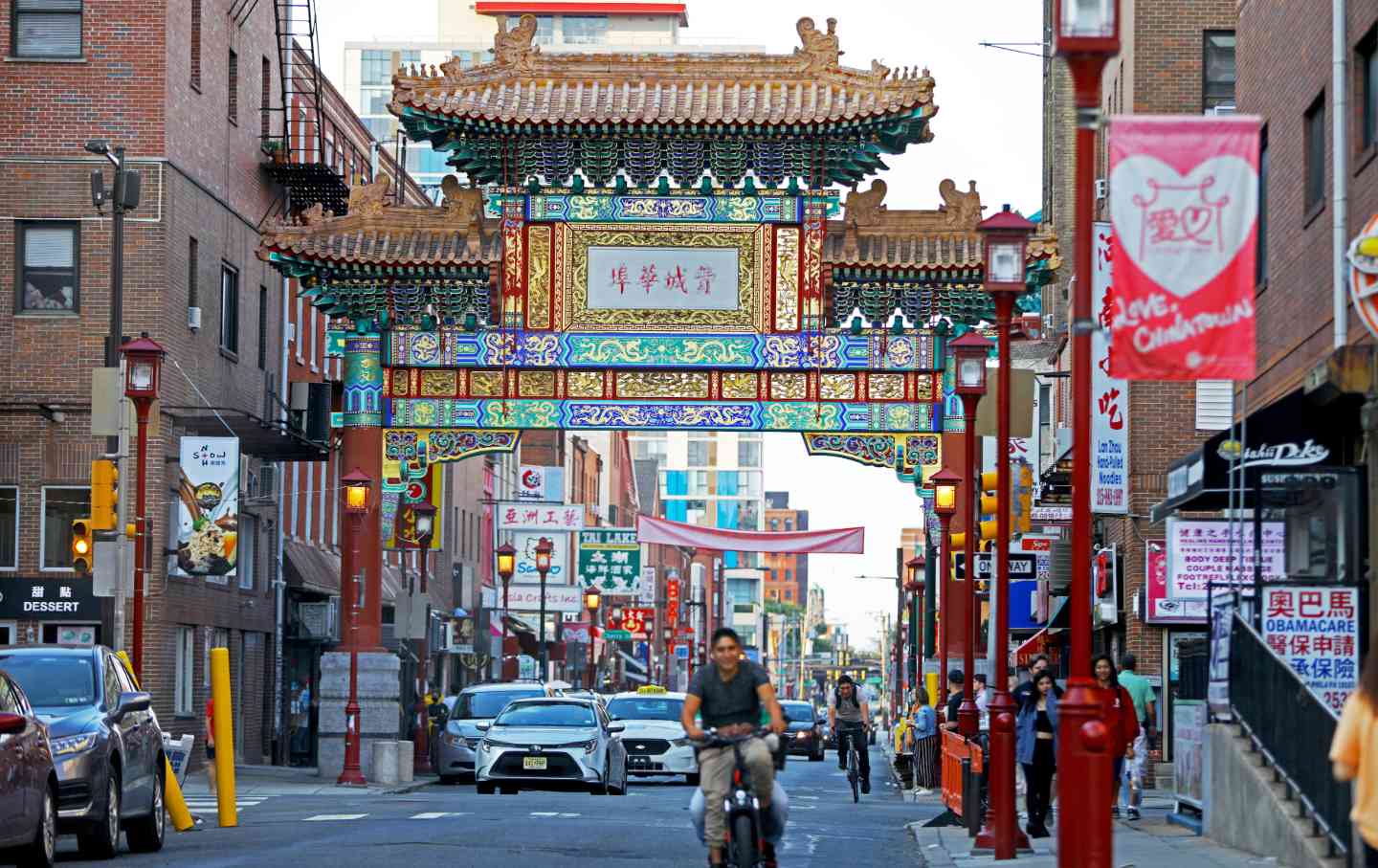
The “Save Chinatown” Coalition Goes on the Defensive in Philadelphia The “Save Chinatown” Coalition Goes on the Defensive in Philadelphia
The construction of a new basketball arena threatens to fill the neighborhood with more traffic and raise rents.

Human Rights for Everyone Human Rights for Everyone
December 10 is Human Rights Day, commemorating the anniversary of the Universal Declaration of Human Rights (UDHR), one of the world's most groundbreaking global pledges.
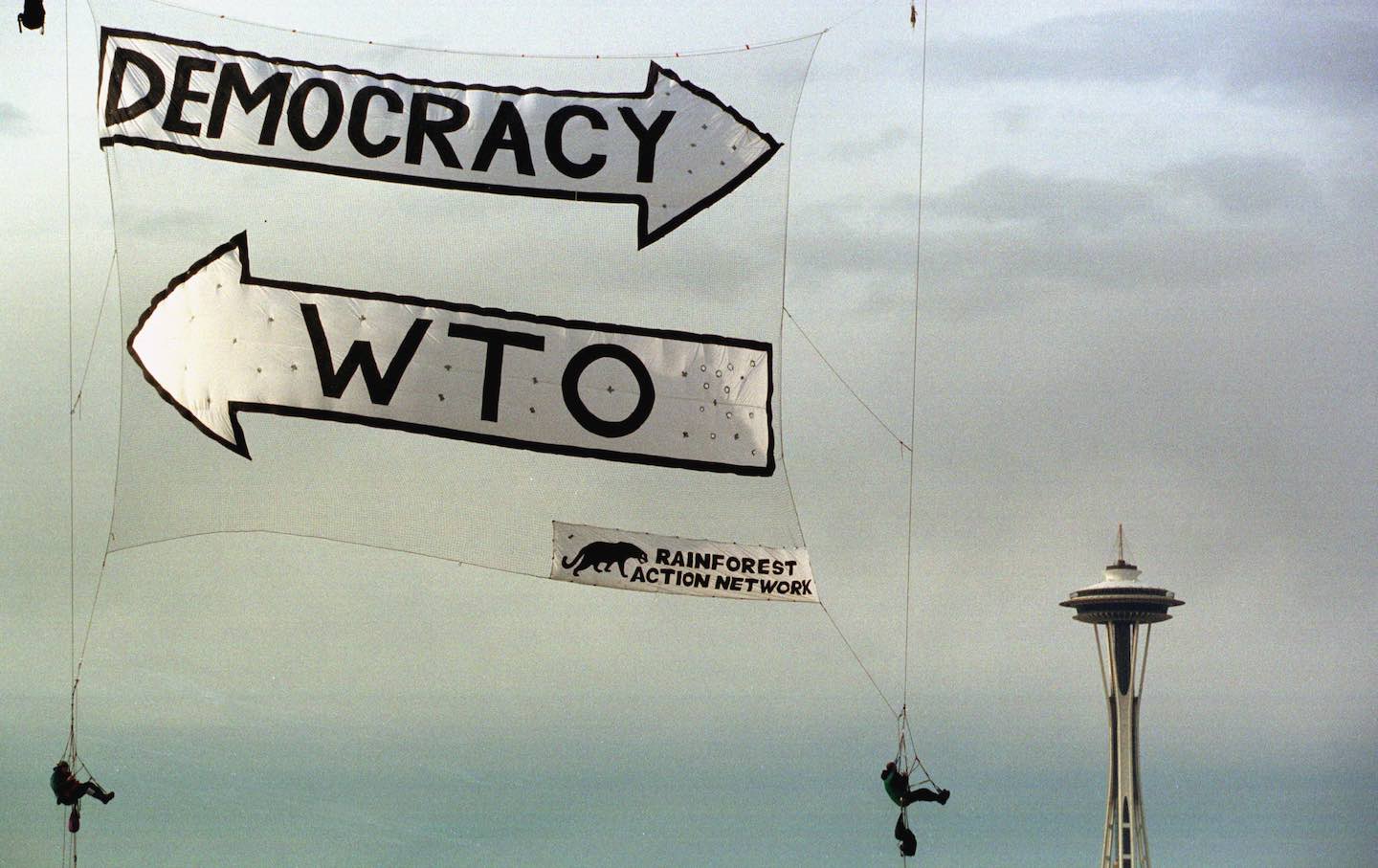
25 Years Ago, the Battle of Seattle Showed Us What Democracy Looks Like 25 Years Ago, the Battle of Seattle Showed Us What Democracy Looks Like
The protests against the WTO Conference in 1999 were short-lived. But their legacy has reverberated through American political life ever since.
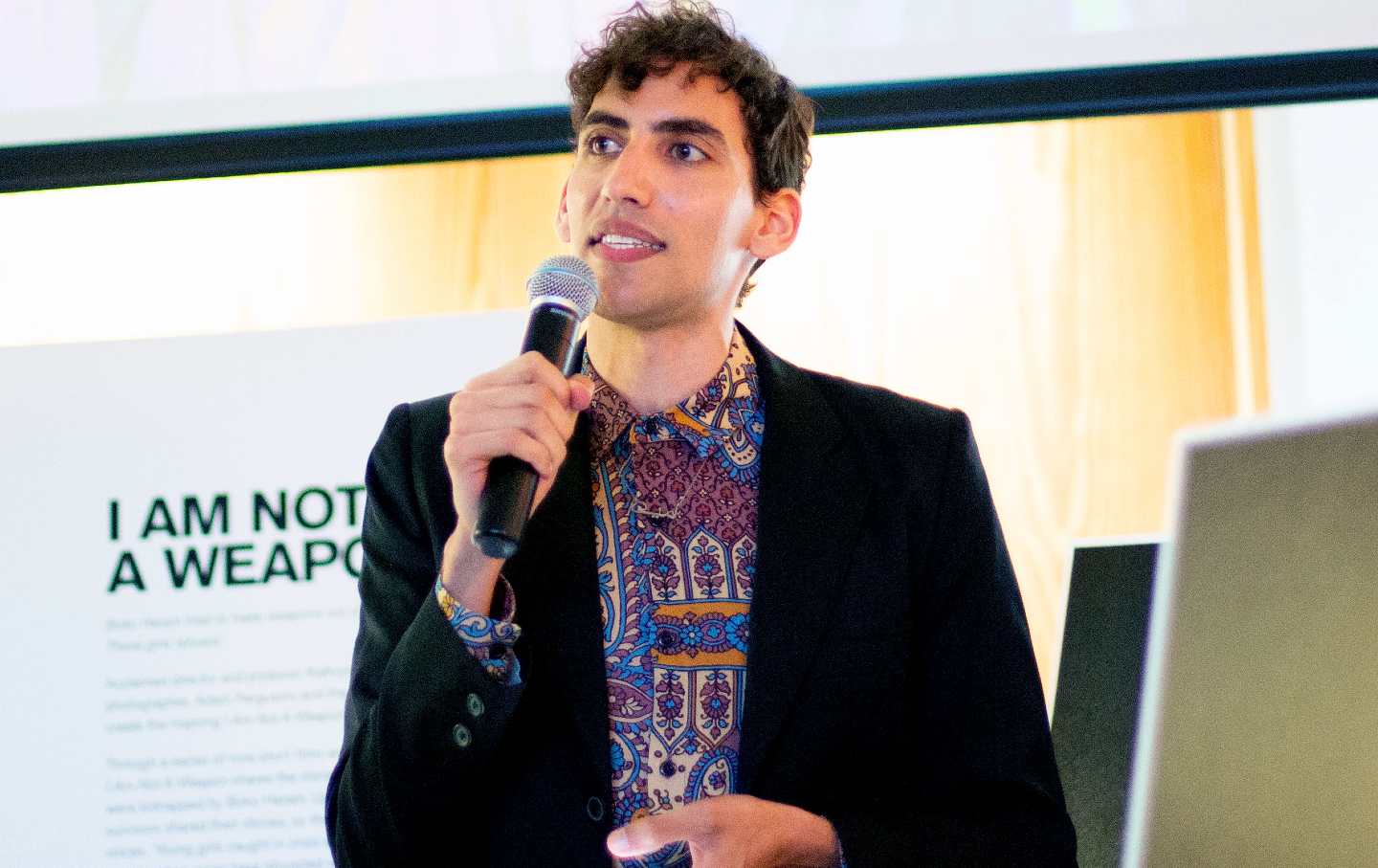
Hollywood’s Vocal Actors Union Goes Silent on a Gaza Ceasefire Hollywood’s Vocal Actors Union Goes Silent on a Gaza Ceasefire
Amin El Gamal, head of SAG-AFTRA's committee on Middle Eastern and North African members, has advocated for a statement supporting a ceasefire in Gaza—so far without success
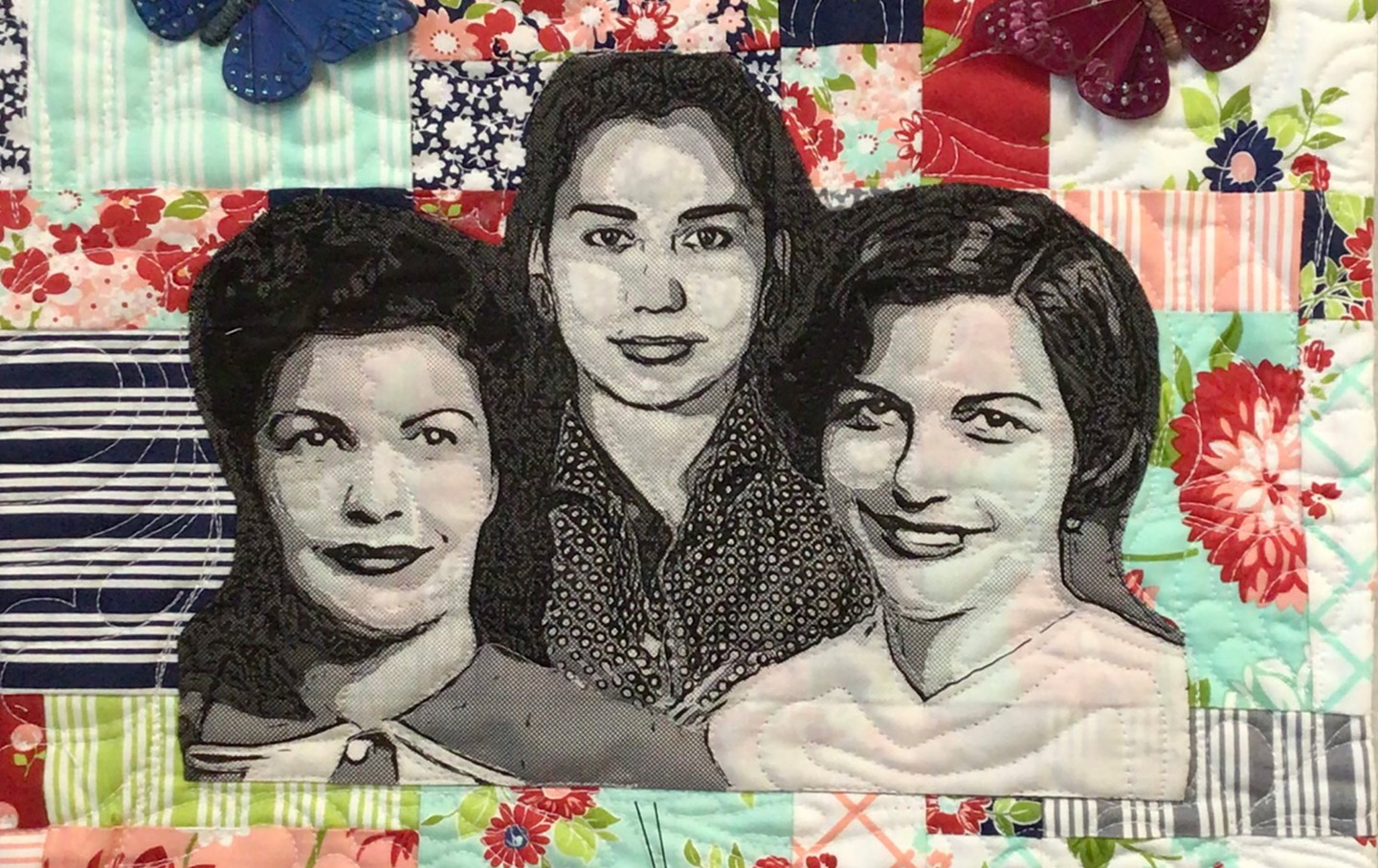
The Mirabal Sisters The Mirabal Sisters
Patria, Minerva, and María Teresa Mirabal were sisters from the Dominican Republic who opposed the dictatorship of Rafael Trujillo; they were assassinated on November 25, 1960, und...


